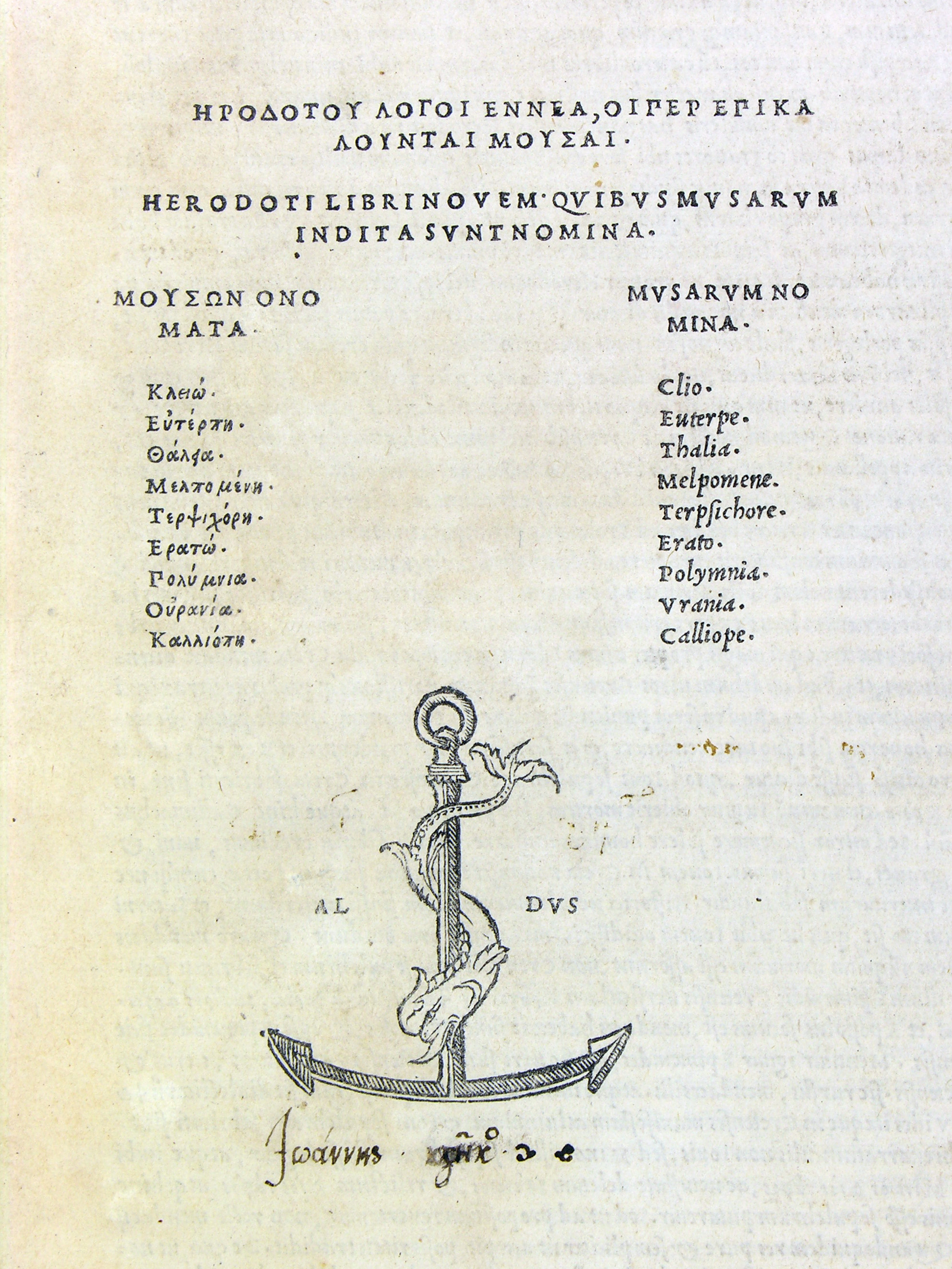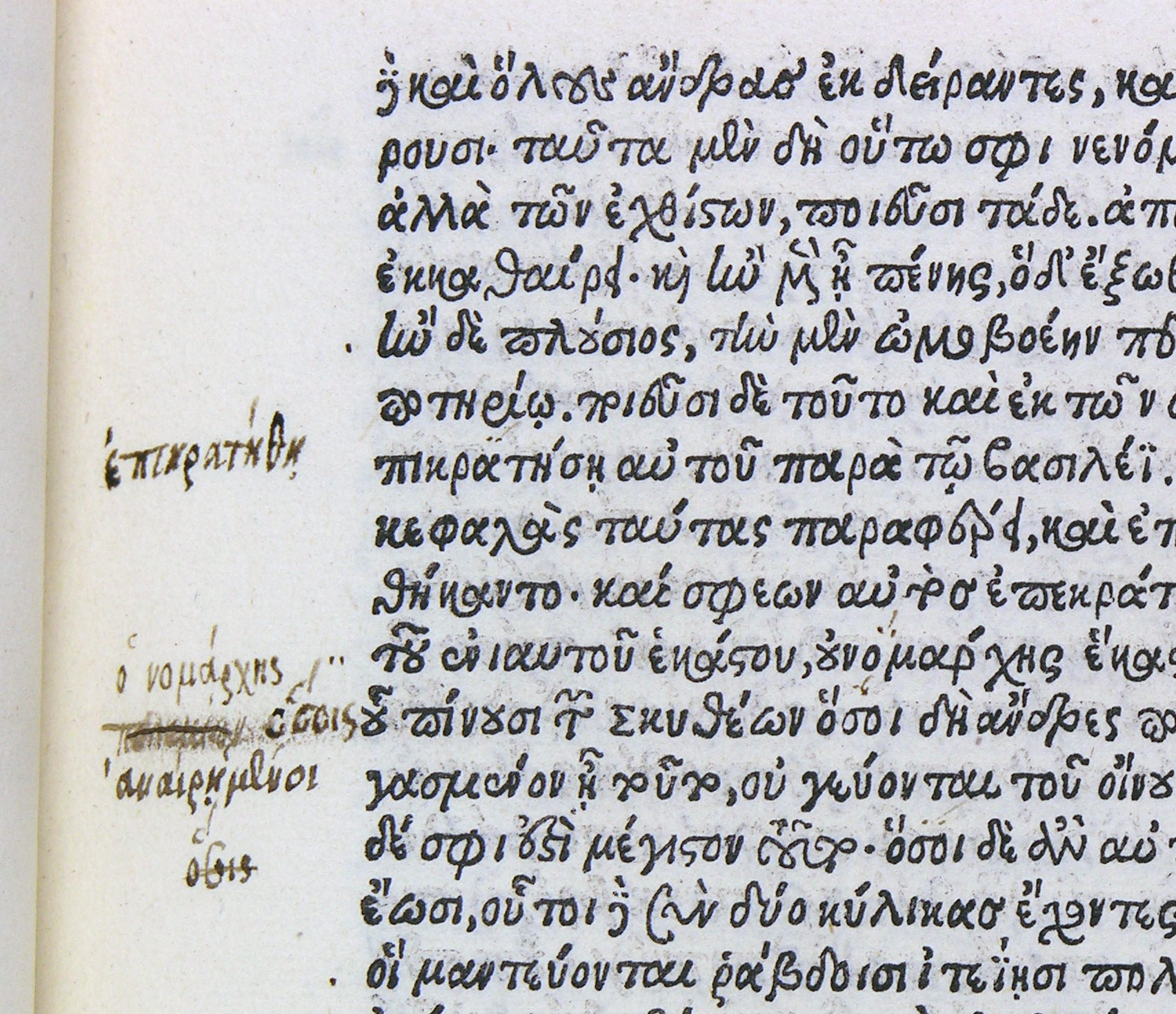Sir John Cheke’s Greek Books
First published June 2010
James Harmer, St John’s College

Fig. 1 St John’s College, Cambridge, Aa.4.48. By permission of the Master and Fellows of St John's College, Cambridge.
A landmark donation made this year to the St John’s College Library by Brian Fenwick-Smith will help future generations of researchers to study the life and work of Sir John Cheke (1514-1557), a figure who, as humanist tutor, classical scholar and author occupies a central place in the history of the English Renaissance. Fenwick-Smith’s donation of three Aldine texts of Greek history that were owned and extensively annotated by Cheke sheds a fascinating light on the intimate Renaissance relationship between scholarship and statecraft.
John Cheke was born in Cambridge and entered St John’s in 1526. He was tutored principally by George Day, another important figure from the College’s early history who was helping to make St John’s a major centre of what is now known as Renaissance humanism. Humanism can be thought of as a programme of educational, cultural and religious reform which had its beginnings in Italy in the fourteenth and fifteenth centuries before spreading rapidly across Europe. Humanism’s chief focus was the study of the classical past – its history, languages, and thought – as a rich resource for the shaping of the whole person. Humanistic study taught one how to live both an examined private life and also a civic, public one. For humanists, scholarship and statecraft went hand in hand: what one found in the histories or poems or orations one studied could be applied directly to the way in which one lived one’s life and served one’s society. Someone with a humanist education could do all kinds of things: understand love, draft a law, write a poem, win a debate, interpret the Bible, and advise a prince. The acquisition of a volume such as this Aldine edition of Greek history – which comes in the wake of other recent donations by Brian Fenwick-Smith, including first editions of Thomas More’s Utopia (1516) and More’s Epigrammata (1521) – shows how much there is still simply to be unearthed, made available, and understood about the dynamic history of reading in this period. The role that continues to be played by College special collections in expanding and developing what resources are available is vital in enabling early modernists to do all kinds of things – pedagogical, bibliographical, conceptual – with those resources. In this sense, then, such donations and such libraries are very much legacies of the humanist project itself.
At St John’s, Cheke excelled at the study of the classical past and its languages, and he played a critical role in developing an understanding of the language at a time when the study of Greek was in its infancy in England. Cheke was admitted as a Fellow of St John’s in 1529 and took his BA in 1530. During the 1530s, Cheke concentrated on improving his Greek studies, and became in 1540 the University’s first Regius Professor of Greek. It was also during this period at St John’s that he taught a number of Johnians who would go on to have distinguished careers, including William Cecil (Elizabeth I’s principal minister) and Roger Ascham (tutor to Elizabeth I). Cheke’s public profile grew further when he was plucked from Cambridge and dropped into the very centre of court life. In 1544, he became tutor to Prince Edward, to whom he taught, in Greek, the works of Aristotle and Plato. The Prince became King Edward VI in 1547, and in 1553, having remained close to Edward throughout his short reign, Cheke was appointed his principal secretary. Yet 1553 also brought the death of the young King, and the staunchly Protestant Cheke was to spend his last years struggling with life in Queen Mary’s Catholic England, spending time in exile and in prison before his early death.

Fig.2 Title page showing ownership signature of John Cheke. By permission of the Master and Fellows of St John's College, Cambridge.
So there is a direct line to be drawn from humanist St John’s to the heart of the political and religious life of mid-Tudor England. Cheke’s work at Cambridge, and especially his distinctive study of ancient Greek texts, was what gave him the authority to advise a young King, help direct government policy, and play a prominent role in the English Protestant Reformation. The donation to the St John’s College Library of a book used by Cheke gives us a vital insight into this extraordinary Renaissance relationship between classical scholarship and the workings of society. The volume comprises three separate works of Greek history bound together in one folio volume: The Histories by Herodotus, The Peloponnesian War by Thucydides, and the Hellenica of Xenophon. The first two works in this volume were printed by the Aldine press in Venice in 1502; the printing of the last work in the volume, the Hellenica, was delayed slightly until 1503 (Aldus was apparently nervous about not having enough manuscripts of Xenophon to work from). Together, these texts form a history of Greece that stretches from the Persian wars, through the Peloponnesian war, and which ends, with Xenophon picking up straight after Thucydides, in 362 BCE. The collation of this copy of Aldus’ edition is complete, its texts beautifully clean. The volume is bound in eighteenth-century English calf, and the pages have been cropped slightly by the binder: this affects some of the annotations in the margins of the Hellenica but leaves the marginalia pertaining to the other texts unaffected. The volume bears the bookplate of Sir George Osborn (1742-1818). Osborn was a descendent of Peter Osborne (1521-92), who was a close friend of Cheke’s and one of the executors of his will. Osborn was responsible for the education of Cheke’s son, Henry (c.1548-1586), and it is possible that some of the marginalia which appear in the volume are in the mid-Tudor hand of Henry Cheke. There are certainly two hands at work in the margins of the volume, and perhaps more: at this stage, however, it is at least clear that Cheke’s hand is a very extensive presence in those texts by Herodotus and Thucydides.

- Fig. 3 St John’s College, Cambridge, Aa.4.48, sig. 2H6r. Cheke notes in the margin of the Histories of Herodotus that the Scythians made ‘conquests’, and then notes that the text is describing ‘The prizes the Scythians bear away’. By permission of the Master and Fellows of St John’s College, Cambridge.
Cheke’s ownership signature appears in Greek on the title page, and Cheke goes on to write down hundreds of individual Greek words and phrases in the margins. Just when he made these notes is a question that would benefit from further investigation, but judging by comparable samples of his hand and the arc of his teaching and study of Greek, it is reasonable to suppose that Cheke annotated the volume during the 1530s. Sometimes one can glimpse Cheke extending his Greek vocabulary: he notes the words for such things as a fawn, a small horse, a ferryman, a vessel for carrying water. At other, more significant moments, Cheke is interested in finding the word that best captures a passage of military action. Several times he comes across descriptions of battles where one side is being overwhelmed by the other: Cheke notes the Greek for being ‘squeezed’ or ‘crushed’ (see, e.g., Peloponnesian War, sig. G2r). Relatedly, in reading Thucydides, Cheke notes passages that describe a tactical retreat or negotiated alliance (Peloponnesian War, sigs A5r, K6r). In the Histories of Herodotus, Cheke notes that when they made a conquest, the Scythians would carry away prizes – the scalps and skins of their enemies (sig. 2H6r). He consistently has an eye for the detail that distills a passage, and makes a habit of finding in these texts a single Greek keyword which encapsulates a chunk of writing. Cheke picks out words that are moral, political, action-packed. Here is a passage from Herodotus about ‘retribution’ (Histories, sig. G5r); here another touching on the ‘barbaric’ (Histories, sig. 2S2r). Here is a passage in Thucydides about being ‘suspicious’ (Peloponnesian War, sigs B5r, L5r), here another about handling ‘grievances’ (Peloponnesian War, sig. L1r). And here – close by – is a good example of ‘wickedness’ (Peloponnesian War, sig. L1r). What Cheke is doing with these books is extracting examples of policy and conduct, and finding Greek words and meanings for those examples that can refine or enrich English words and deeds. This is the stuff, these are the textual activities, out of which good courtiers, good advisers, and good Kings are made.